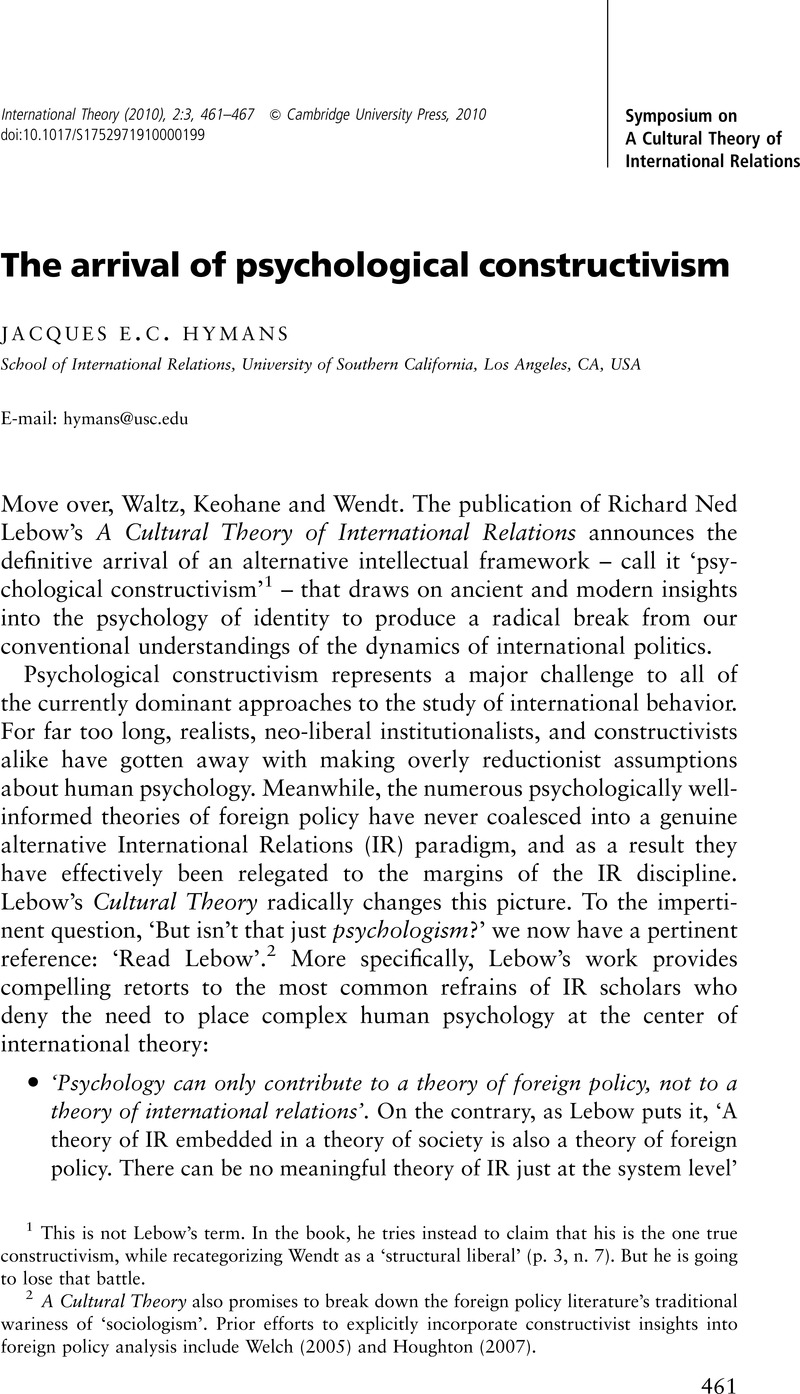Crossref Citations
This article has been cited by the following publications. This list is generated based on data provided by Crossref.
Sasley, Brent E.
2011.
Theorizing States’ Emotions1.
International Studies Review,
Vol. 13,
Issue. 3,
p.
452.
Wolf, Reinhard
2011.
Respect and disrespect in international politics: the significance of status recognition.
International Theory,
Vol. 3,
Issue. 1,
p.
105.
Zarakol, Ayse
and
Subotic, Jelena
2011.
Cultural Intimacy in International Relations.
SSRN Electronic Journal,
Wolf, Reinhard
2012.
Der „emotional turn“ in den IB: Plädoyer für eine theoretische Überwindung methodischer Engführung.
Zeitschrift für Außen- und Sicherheitspolitik,
Vol. 5,
Issue. 4,
p.
605.
Solomon, Ty
2012.
The Turn to Psychology in Constructivism.
International Studies Review,
Vol. 14,
Issue. 4,
p.
637.
Subotic, Jelena
and
Zarakol, Ayşe
2013.
Cultural intimacy in International Relations.
European Journal of International Relations,
Vol. 19,
Issue. 4,
p.
915.
Shannon, Vaughn
2014.
Do Rights Make Fights?.
International Studies Review,
Vol. 16,
Issue. 2,
p.
333.
Hall, Todd H.
and
Ross, Andrew A.G.
2015.
Affective Politics after 9/11.
International Organization,
Vol. 69,
Issue. 4,
p.
847.
Browning, Christopher S.
2015.
Nation Branding, National Self-Esteem, and the Constitution of Subjectivity in Late Modernity.
Foreign Policy Analysis,
Vol. 11,
Issue. 2,
p.
195.
Frank, Cornelia
2015.
Handbuch Internationale Beziehungen.
p.
1.
Flockhart, Trine
2016.
The problem of change in constructivist theory: Ontological security seeking and agent motivation.
Review of International Studies,
Vol. 42,
Issue. 5,
p.
799.
Labrecque, Charles-Louis
2017.
La psychologie politique: quelle utilité pour l’étude de la politique étrangère du Canada?.
Canadian Foreign Policy Journal,
Vol. 23,
Issue. 2,
p.
171.
Frank, Cornelia
2017.
Handbuch Internationale Beziehungen.
p.
429.
Meissner, Richard
2017.
Paradigms and Theories Influencing Policies in the South African and International Water Sectors.
p.
155.
Kornprobst, Markus
2017.
Richard Ned Lebow: A Pioneer in International Relations Theory, History, Political Philosophy and Psychology.
Vol. 2,
Issue. ,
p.
45.
Dingott Alkopher, Tal
2018.
EU’s Disunited Response to the 2015 Refugee Crisis: A View from the Perspective of the Psychological Theory of DID.
Political Psychology,
Vol. 39,
Issue. 6,
p.
1389.
Soltaninejad, Mohammad
2019.
Iran and Saudi Arabia: Emotionally Constructed Identities and the Question of Persistent Tensions.
Asian Politics & Policy,
Vol. 11,
Issue. 1,
p.
104.
Kumral, Mehmet Akif
2020.
Exploring Emotions in Turkey-Iran Relations.
p.
1.
Tschantret, Joshua
2020.
Democratic Breakdown and the Hidden Perils of the Democratic Peace.
European Journal of International Relations,
Vol. 26,
Issue. 4,
p.
1129.
Curanović, Alicja
2020.
Przeznaczeni do wielkości! Poczucie misji w polityce zagranicznej. Przypadek Rosji.



